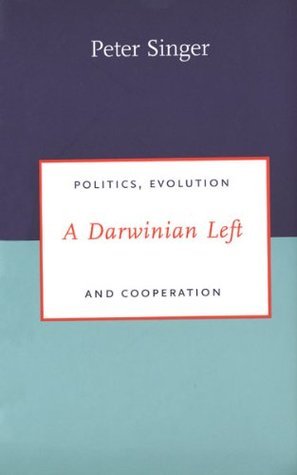What do you think?
Rate this book


81 pages, Kindle Edition
First published March 11, 2000
“An understanding of human nature in the light of evolutionary theory can help us to identify the means by which we may achieve some of our social and political goals... as well as assessing the possible costs and benefits of doing so" (p15).Abandoning Utopia
1) People strive to promote themselves and their kin above othersThus, Singer laments:
2) Only coercive state apparatus can prevent them so doing
3) The individuals in control of this coercive apparatus themselves seek to promote the interests of themselves and their kin and corruptly use this coercive apparatus to do so
“What egalitarian revolution has not been betrayed by its leaders?” (p39)In addition, human selfishness suggests, if complete egalitarianism were achieved, it would be economically inefficient—because it would remove the incentive of self-advancement that lies behind the production of goods and services, not to mention of works of art and scientific advances.
“It is not from the benevolence of the butcher, the brewer, or the baker that we expect our dinner, but from their regard to their own interest.”Again, the only other means of ensuring goods and services are produced is state coercion, which, given human nature, will inevitably be exercised corruptly and inefficiently.
“On the side of the weak, not the powerful; of the oppressed, not the oppressor; of the ridden, not the rider” (p8).While many leftists have objected to Singer’s watered-down leftism, neither is this definition likely to find favor on the right. Few conservatives would admit to being on the side of the oppressor.
“By knocking out the idea that we are a separate creation from the animals, Darwinian thinking provided the basis for a revolution in our attitudes to non-human animals” (p17).This makes our consumption of animals as food, our killing of them for sport, our enslavement of them as draft animals, or even pets, and our imprisonment of them in zoos and laboratories all ethically suspect, since these are not things generally permitted in respect of humans.
“[The assumption] that all inequalities are due to discrimination, prejudice, oppression or social conditioning.” (p61).Rather, he accepts that some disparities in achievement reflect innate differences between individuals and groups in ability, temperament and preferences.
“From each according to his ability… would be nonsense if abilities were equal.”With regard to group differences, Singer wisely evades the vexed issue of race differences in intelligence. Instead, he illustrates the possibility that not “all inequalities are due to discrimination, prejudice, oppression or social conditioning” with the marginally less incendiary case of sex differences:
“If achieving high status increases access to women, then we can expect men to have a stronger drive for status than women” (p18)This may partly explain patriarchy and the the pay gap.
“Even if there were a genetic component to something as nebulous as unemployment, to say that these genes are ‘deleterious’ would involve value judgements that go way beyond what the science alone can tell us” (p15).Viewing certain character traits, and the genes that contribute to them, as undesirable certainly involves an extra-scientific value judgement, but almost everyone accepts some traits (e.g. generosity, conscientiousness, health, happiness) as more desirable than others (e.g. selfishness, laziness, depression, illness).